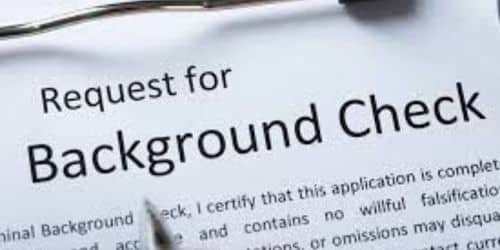A personal background check on someone for a job or apartment is likely something you’ve considered doing at some point. It’s the safest way to find out who you’re dealing with, whether you’re leasing, dating, or doing business. But have you ever paused for a moment to consider what a background check consists of?
In this post, we’ll define and explain what a personal background check for a job or an apartment consists of. But let’s take things slowly at first.
What Is a Background Check?
A background check is the gathering and verification of information or records about an individual from private and public sources. What is the purpose of a background check for employment? It provides an opportunity for a business to check a person’s:
- Criminal record
- Education
- Employment history
- Vehicle records
- Credit history
Whether you’re applying for a job, looking for a new apartment, or renting a car, you might have to go through a background check. Background checks are designed to ensure that everyone is safe and successful. A candidate’s rights are considered and protected by applicable federal, state, and local regulations.
What is a Background Check Useful for?
Background checks benefit both the consumer (the subject of the background check report) and the end-user (an employer or contractee) in a variety of legal and practical ways.
#1. Trust and transparency
Contract positions involve some level of risk for both the customer and the contractor. You can build a community of trust and transparency by requiring your subcontractors to go through a background check before they interact with the public.
#2. Legal compliance
Reduce the likelihood of negligent hiring and wrongful termination lawsuits. The cost of employment litigation can cripple company capital and resources, so conducting a formal process to screen your employees will assist you in navigating legal requirements.
#3. Employee safety
Employees maintain peace of mind among their colleagues as a result of the background check process, which encourages honesty and communication with the employer.
What is a Background Check Consist Of
When you hear the words “background check,” the first thing that comes to mind is probably checking a person’s criminal record. And, while they are frequently included in the process, these reports contain more information.
Before we proceed, it is important to note that not all background checks are created equal. There are various types you can run, as you’ll see later. What shows up on a background check depends on which one you opt for.
Let’s talk about what they can reveal.
#1. True Identity
The majority of background checks begin with identity verification. Regardless of what you already know, the report will include their personal information such as their name and address.
Knowing someone’s true identity can be useful in a variety of situations. When hiring an employee, for example, you must ensure that they provided accurate personal information in their application. When meeting someone you met online, it’s also a good idea to verify their identity to ensure they’re not catfishing you.
#2. Past Addresses
The address history is a timeline of all the places a person has lived recently. Typically, the report shows all of the addresses where they’ve received mail. You should be able to see it after conducting a background check on whether they were renting or staying with their parents or at college.
If your local laws allow it, this information can be extremely useful when screening tenants. Although it is difficult to predict whether someone will be a good renter based on this information, it can still be useful.
#3. Criminal Records
Most people want to know if criminal records are included in a background check when they wonder what appears on one. Background checks can reveal felony and misdemeanor convictions, as well as any pending cases. Any history of incarceration as an adult also shows up in the report.
This is useful information when applying for a job or purchasing firearms, among other things. Even if a person has been cleared of all charges, their name may still appear in background checks. They won’t show up in screenings until they remove them from their records.
#4. International Crimes and Felonies
One of the most common reasons why people conduct background checks is to see if a person has a criminal record. In many cases, simply checking to see if they’ve been arrested or charged with anything in the United States isn’t enough. As a result, some background checks are intended to reveal international crimes and felonies.
SSN verification is another response to the question “what does a background check consist of?” Employers use social security numbers to determine whether a person is eligible to work in the United States.
The SSN verification reveals the name and address associated with the social security number the candidate has provided.
#6. Registry of Sexual Offenders
All states in the United States are required to maintain a sex offender registry. These reports are public records and appear in criminal background checks. You do not need to run a background check to look up the sex offender list in the country. The registry can be accessed by anyone on the Web.
Just keep in mind that it excludes minor charges. A more thorough examination is usually preferable.
#7. Employment History
If you have ever wondered what goes into a background check for a job, you should know that employers can look into your employment history as part of the recruitment process. This is because candidates frequently lie on their resumes.
Employers who want to hire the right people must verify that all of the information they’ve provided is accurate. They can simply conduct a background check rather than checking each previous employment themselves.
#8. Credit Report
Credit reports are another important piece of information that screenings can reveal. It includes information such as credit card debt, mortgage payments, and car payments. Employers need the candidate’s written permission to run a credit check when recruiting. Some firms require it.
#9. Driving History
Background checks and driving records are governed by state laws in the United States. Employers, volunteer organizations, schools, and others can access driving records dating back up to ten years in some of them.
What Is a Background Check for a Job?
A background check consists of components based on the type of position a job candidate is applying for. Criminal searches, verifications, and ad hoc services make up the three main parts of background checks. Working with a background checks company to select the components you need to ensure a thorough and compliant program is the best way to design a background check.
Not all background checks are created equal. While the majority of background checks consist of these three types of components, there are often dozens of variations within those components that can impact the quality and compliance of your background checks. You don’t want to create a background check that does not meet with your needs, puts your company at risk, or wastes money. We’ve worked with businesses that spent $50 on a background check they thought was thorough, only to discover that it had significant gaps and didn’t cover many U.S. jurisdictions (such as California).
What Is a Background Check for an Apartment?
A national criminal background check, credit report, eviction history, and employment history can all be included in a background check for an apartment. Specific landlords or property managers may choose to conduct one or all of these screenings, and applicants must consent to a background check.
How Long Do Background Checks Take?
The entire application process usually takes only a few days – anywhere from 48 to 72 hours. The background check is a minor component of the overall application process and should take no more than one to three hours to complete.
What Do Apartment Complexes Look for in a Background Check?
A background check on an apartment covers a variety of topics. Here are some things your landlord might look at:
#1. Your previous rental history.
The background check will include a rental history report. This report lists all the addresses of your previous rentals, along with the contact information for your former landlords and property managers. You won’t necessarily be denied the apartment if you don’t have a rental history. In this case, the landlord may check your references, proof of employment, and pay stubs. The landlord simply wants to ensure that you will pay your rent on time. If you have been evicted in the past, or if you consistently pay your rent late, this may raise a red flag for the landlord, and they may reject your application.
#2. Your work history.
Landlords typically want your income to be three times the monthly rent. When they investigate your employment history, they will want to verify your income, ensure that you work where you say you work and look at how long you’ve been at that job. The landlord may contact your employer to confirm your employment status. They usually want to see that you’ve been working in the same place for at least six months.
#3. Your credit history.
A credit score of 600 or higher is typically required by landlords and apartment communities, but this isn’t always the case. Even if your score is on the lower end, you will not be automatically rejected. The score is important, but landlords will also look for patterns in your credit history.
#4. Your criminal history.
Convictions are only one factor in criminal background checks. It also attracts non-convictions (cases that were dismissed or not prosecuted). Non-convictions might stay on your history report for seven years, while convictions stay on your history report permanently unless you are able to have your record expunged or sealed. Be honest with the landlord about any concerns you have about your background. This will allow you to explain the situation before the landlord discovers it on your report.
How Far Back Do Apartment Background Checks Go?
According to TransUnion, a credit check will typically go back seven to ten years. Most negative information, such as loan defaults or car repossessions, will remain on your credit report for seven years. A bankruptcy can affect your credit score for up to ten years.
Personal Background Check
A consumer-level background check that allows job seekers to view general information about themselves online is known as a personal background check. Although conducting a personal background check is prudent for job seekers, it is not exhaustive. A personal background check is frequently limited in the information they reveal, in contrast to the extensive background screening available to employers.
You must provide basic personal information such as your name, date of birth, residential address, and Social Security number in order for a screening company to conduct a personal background check on you. Although results typically appear instantly, some background checks can take up to a few days.
Personal background checks can reveal the following basic public information:
- Identity verification (SSN trace)
- Family members and well-known associates
- Address history
- Criminal history
- Sex offender registry
Your results may be much more limited than the information available to employers. Most background screening companies that perform personal background checks are not considered consumer reporting agencies as defined by the Fair Credit Reporting Act, which may increase your chances of receiving inaccurate results.
How is a background check done?
Background checks begin with confirming an individual’s identity using the information they provide, such as their date of birth and Social Security number. Then searches are conducted using a variety of public databases and court records depending on the type of information sought.
How long does a background check take?
The timeline depends on the type of background checks and the information needed, but a pre-employment background check typically takes two to five business day
What would make someone fail a background check?
A person may fail background checks for different reasons, including criminal history, educational discrepancies, poor credit history, a damaged driving record, a false employment history, and a failed drug test.
How do I prepare for a background check?
How to Prepare for Background Checks:
- Clean up your social media profiles and check your privacy settings.
- Maintain thorough records of your academic achievements and previous employment.
- Obtain copies of your records.
- Be honest.
- Inform your professional references that they may be contacted.
Are you hired if they do a background check?
Many employers conduct background and reference checks on candidates during the hiring process. However, a job offer may be contingent on the results of the background check in some cases.
How does a background check clear?
If a report is marked as ‘clear,’ it means that nothing of concern was discovered during the investigation. The candidate has been verified, and there is no reason for your company to stop the hiring process.
Is it easy to fail a background check?
If you have a criminal record, you may be disqualified from background checks. This is especially true if the offenses on your record pertain to the job you’re applying for.
Is it hard to pass a background check?
Background checks are complicated and can produce a variety of results. Contrary to popular belief, background checks are not something you pass or fail.
Conclusion
What does a background check consist of? Everything, in a nutshell. It depends heavily on what type of background checks we’re talking about. There is a plethora of background information available on a person, but in order to obtain the information you seek, you must also select the appropriate type. It all comes down to running a check that is appropriate for your current situation.
Related Articles
- WHAT IS EMPLOYMENT VERIFICATION: All You Need To Know
- VERIFICATION OF EMPLOYMENT LETTER: How To Write One
- Loan Management System: How It Works
- BUYING AN APARTMENT: Step-by-step Beginners Guide






